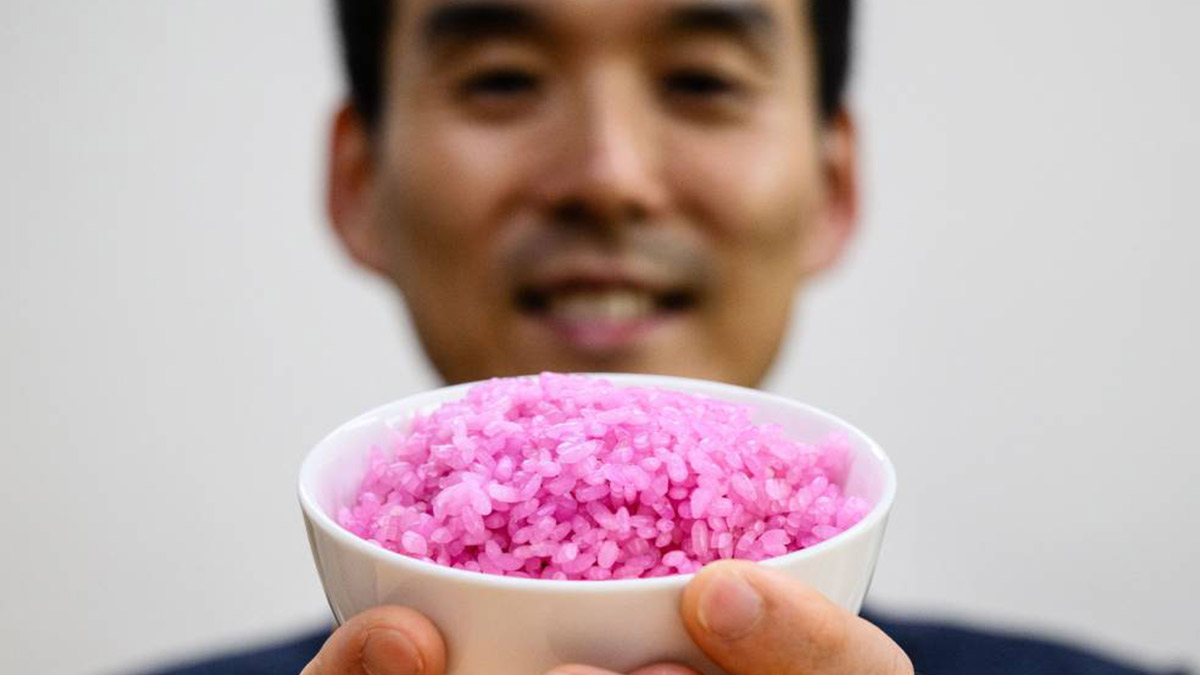Soon from South Korea laboratory: ‘Meaty rice’

DIET OF THE FUTURE Professor Hong Jin-kee holds a bowl containing pink “meaty rice” at the Yonsei University in Seoul. —Agence France-Presse
SEOUL, Korea — In a small laboratory in Seoul, a team of South Korean scientists is injecting cultured beef cells into individual grains of rice, in a process they hope could revolutionize how the world eats.
From helping prevent famines to feeding astronauts in space, team leader and professor Hong Jin-kee believes his new so-called “meaty rice” could become an ecofriendly, ethical way for people to get their protein.
No animals were harmed in the creation of the dish, which looks like a regular bowl of rice—albeit pink—but it gives off a faint buttery aroma, the result of being packed with beef muscle and fat cell culture.
READ: Hidden threat to food security, habitat
Using cultured meat, “we can obtain animal protein without the slaughter of livestock,” Hong, of Seoul’s Yonsei University, told Agence France-Presse (AFP).
Article continues after this advertisementCompanies worldwide have sought to commercialize meat alternatives, such as plant-based or cultured meat, due to ethical issues surrounding industrial livestock rearing, as well as environmental concerns linked to the greenhouse gas emissions from animal farming.
Article continues after this advertisementHong, who has a background in organoids and biomedical sciences, chose rice for his research as the grain was already the top source of protein for people in Asia.
His process can be currently time-consuming: a regular rice grain is coated with fish gelatin to help with adherence, then individually injected with beef cells before being cultured in a petri dish for up to 11 days.
Rice possesses a “slightly porous structure,” Hong said, and once the beef cells have been injected into the rice, the grain offers “an ideal structure for cells to grow uniformly from the inside out.”
Carbon footprint
Hong’s “meaty” rice contains 8 percent more protein and 7 percent more fat than regular rice.
Hong and his team are still working on how to scale the process, he said, but he hopes to get his creation approved as a relief food for emergency situations in two African countries.
“For those who are limited to… just one meal a day, a slight increase in (protein content), even by just a few percent, becomes incredibly important,” he said.
South Korea has not yet approved any cultivated meat for consumption, but it announced in 2022 plans to plough millions of dollars into a “foodtech” fund, while separately identifying cell-cultured meat as a priority research area.
Cultivated meat is sold in Singapore and the United States, but Italy banned it last year citing a need to safeguard its livestock industry.
Some scholars say potential ethical concerns with cultured meat include the sourcing of the initial animal cells.
It is difficult to be “certain about the safety of the serum used in culture media, and the antibiotics and hormones added during the culturing process,” Choi Yoon-jae, a former emeritus professor at Seoul National University, wrote in a column on the website Chuksan News.
According to Hong’s team, their hybrid rice method significantly reduces protein’s carbon footprint by eliminating the need to raise and farm animals.
For every 100 grams (3.5 ounces) of protein produced, it releases 6.27 kilograms (13.8 pounds) of carbon dioxide, he estimates—eight times less than traditional beef production. —Agence France-Presse